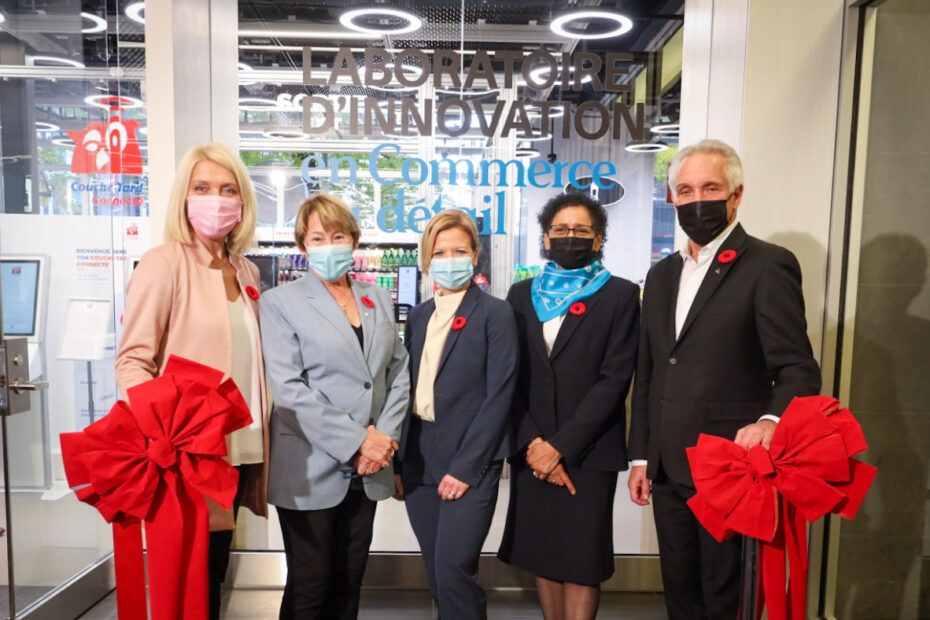
Quebec’s Minister for the Economy, Lucie Lecours, was on hand Monday, Nov. 8, for the official inauguration of the Retail Innovation Lab at the Bensadoun School of Retail Management at the Desautels Faculty of Management. The Lab, which began operations in January, is designed to provide a look at groundbreaking research and innovations, such as frictionless technologies, which will shape the future of the retail sector in a post-pandemic world.
The Retail Innovation Lab brings students together with key players in the local retail sector, offering researchers and students a chance to test ideas out in a real retail environment.
“It’s really a special moment for all of us to be able to inaugurate together this Retail Innovation Lab,” Principal Suzanne Fortier told the Monday morning news conference. “It’s very inspiring for us, and also very exciting for us to see this Lab in the middle of our campus.”
The Lab is a partnership between McGill and Quebec-based convenience store giant Alimentation Couche-Tard Inc., which opened a Couche-Tard store on the ground floor of the Bronfman building at the corner of Sherbrooke and McTavish streets. Inside the store, a Couche-Tard Connecté section allows customers to choose their items and walk out – with payment processed automatically through an app.
Among the other dignitaries on hand for the official inauguration were Yolande Chan, the Dean of McGill’s Desautels Faculty of Management; Sophie Provencher, the Vice-President of Operations (Quebec West) for Alimentation Couche-Tard Inc.; and Norman Jaskolka, the Chairman of Aldo Group, the company founded by Aldo Bensadoun, the school’s namesake.
Earlier this year, Quebec’s Economy Ministry funded the Bensadoun School for $5 million over four years – a large part of which is going to help fund the Lab.
An innovation centre: Lecours
Minister Lecours hailed the project as a testament to innovation, and called the McGill students involved with the project the business leaders of tomorrow.
“It’s a great day for the retail sector in Quebec,” Lecours said. “This is the first laboratory in the world dedicated to the competitiveness of retailers. I congratulate everyone involved in this initiative for their engagement in the digital transformation of our retail sector.”
The minister also praised the “synergy” between the Bensadoun school, Couche-Tard, and the students and researchers involved in looking for technological solutions to the challenges ahead for Quebec’s retail sector, which is still reeling from the disruptions brought on by the COVID-19 pandemic.
“Our retail sector needs to find itself, to innovate, to adapt, and to continue to turn toward new technologies and e-commerce,” Lecours said. “The behaviours and expectations of consumers have changed. We’ve seen it in an important way over the last few years, and especially in the last year, and in the last 20 months.”
‘A live testing ground’
Adapting business practices to those new consumer behaviours is a central part of what the Retail Innovation Lab is all about.
“The lab is a live testing ground for retail technologies, allowing us to discover innovative solutions to enhance the consumer experience,” said Zahoor Saeed Chughtai, the Lab’s Operations and Projects Manager. “For example, we are looking at what factors motivate shoppers to purchase certain products, with the objective of incentivizing them to purchase healthier food items. Another project is to identify key features related to consumer purchasing behaviour that can help retailers better predict customer demand in these uncertain times.
Chughtai says since the pandemic began, fewer consumers are out and about, and when they do get out, they generally spend less time shopping, and want to minimize physical contact as much as possible. For now, it isn’t clear how much of the COVID-19 experience will filter into consumers’ habits once the pandemic ends.
“As restrictions are being lifted, and students are back on campus, we are looking forward to analyzing data and conducting scientific research to gain further insights into particular shopping behaviours of our primary customer segments, with the ultimate goal of enhancing their overall shopping experience,” Chughtai said.
